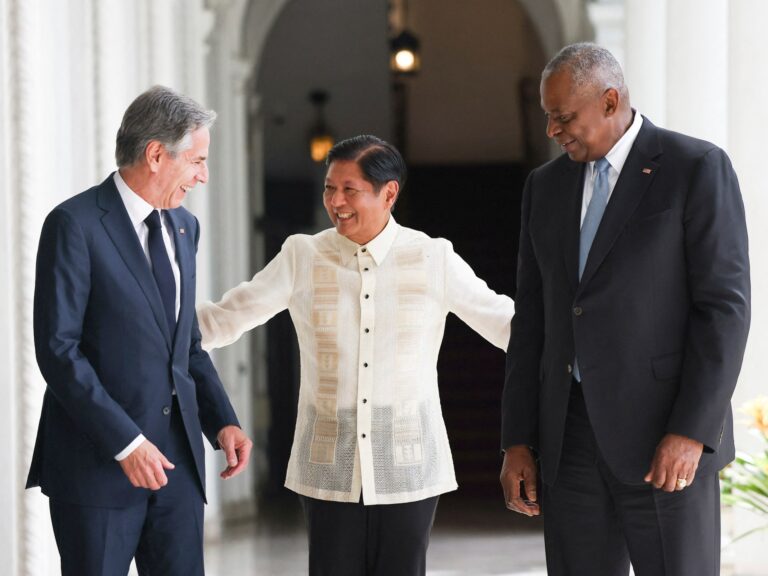Manila and Washington have grown closer in ties amid rising tensions with Beijing over disputes in the South China Sea.
Philippine President Ferdinand Marcos Jr., welcoming U.S. Secretary of State Antony Blinken and Defense Secretary Lloyd Austin to Manila, stressed the need for regular and open consultations between Manila and Washington to ensure an “agile” response amid ongoing tensions in the South China Sea dispute.
Since taking office in 2022 to replace Rodrigo Duterte, Marcos has moved the Philippines closer to the United States.
On Tuesday, he hosted Blinken and Austin at Malacañang Palace ahead of talks with Philippine Foreign Secretaries Enrique Manalo and Gilberto Teodoro, marking the first time Manila will host so-called “2+2” talks between the two countries.
“It’s always very gratifying to have those lines of communication very open so that everything that we do together, both in terms of our alliance and in terms of our specific situation here in the West Philippine Sea and in the Indo-Pacific, is continually examined and reexamined and we are agile in our response,” Marcos said.
Blinken said the meeting was evidence of “the stable partnership and very high level of engagement between our two countries.”
“We are truly grateful for this partnership,” Blinken told Marcos.
The Philippines is one of several Southeast Asian countries claiming parts of the South China Sea, and tensions with China, which claims almost the entire area, have escalated sharply over the past year.
Second Thomas Shoal, about 200 kilometers (122 miles) from the western Philippine island of Palawan and more than 1,000 kilometers (620 miles) from China’s southern island of Hainan, is where Manila conducts routine resupply missions to a ship that ran aground in 1999, but has emerged as a key point of contention.
Last month, a Filipino sailor lost a finger after what Manila described as a “deliberate high-speed collision by the Chinese coast guard.”
The Philippine government has rejected a U.S. offer of help but reached a “tentative agreement” with China this month to address the differences, though details of the agreement have not been made public.
State Department spokesman Matthew Miller said Secretaries Blinken and Austin discussed their “shared commitment to uphold international law in the South China Sea,” and U.S. officials reiterated the U.S.’s “firm commitment to the Philippines” under the mutual defense treaty between the two countries.
Blinken and Austin visited Manila after meeting with the foreign minister of Japan, another key U.S. ally in the region, where they announced the strengthening of U.S. military headquarters in Japan and characterized China as the “greatest strategic challenge” facing the region.
The visit also included a meeting of foreign ministers of the so-called Quad – the United States, Japan, Australia and India – who condemned China’s increasingly assertive actions in the South China Sea despite an international tribunal ruling in 2016 that China’s claims have no legal basis.
China’s foreign ministry condemned Washington and Tokyo over the Quad statement, saying its actions amounted to “normal military development and defense policies” and accused the Quad of “artificially creating tensions, inciting conflict and restraining the development of other countries.”
The Pentagon said U.S. officials will also announce $500 million in foreign military funding for the Philippines during the visit, part of a $2 billion aid package Congress has pledged to Asia-Pacific countries to “counter Chinese aggression.”
The Defense Department also proposes spending $128 million to improve infrastructure at Philippine bases accessible to U.S. forces under the Enhanced Defense Cooperation Agreement (EDCA). The Philippine government agreed last year to add four more bases, including three in the north that would be particularly important in the event of a Chinese invasion of Taiwan, a democratic island that China claims as its territory, bringing the number of bases under EDCA to nine.
The United States and the Philippines are also negotiating an intelligence-sharing pact, known as the General Security of Military Information Agreement, which they had aimed to conclude by the end of 2023 but have yet to sign.

